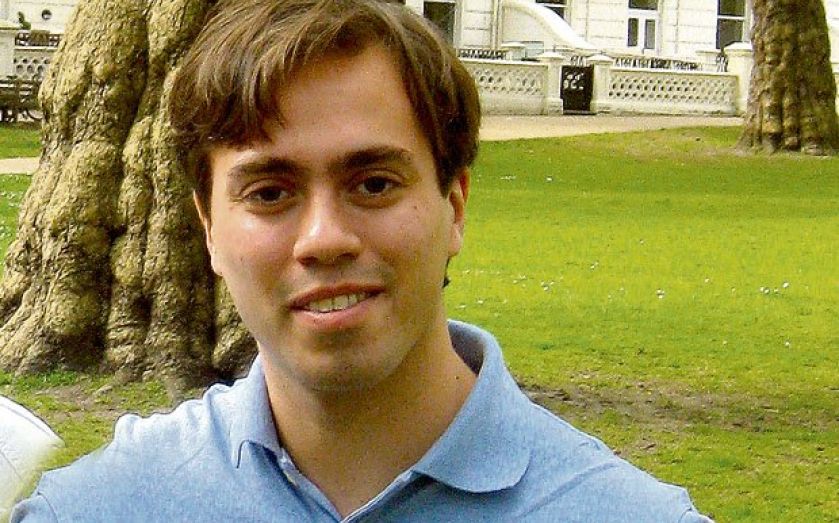On the runway to SUCCESS

Annabel Palmer talks to Cristobal Lowery, founder of GigaFare, which aims to bring algorithmic trading to the airline industry
ARE ENTREPRENEURS born or made? In the age-old debate, Cristobal Lowery – the chirpy 20-something who founded his first company straight out of university – makes a compelling case for the former. In 2010, he created Pix-e, an IT consultancy. It gave him the sales and consulting skills necessary for venture number two: GigaFare. Founded last November by Lowery and business partner Scott Taylor, the company produces a proprietary set of millions of data price points. Set alongside machine learning, the data is being used to provide a platform to help airlines price their fares.
Squeezed in between these two ventures, Lowery spent a year in BNP Paribas’ Brussels office. It quickly became clear that machine learning – the science of getting computers to act without being explicitly programmed – was on the rise. But while banks are considered advanced in their artificial intelligence capabilities, Lowery felt greater potential lay elsewhere. “After a few weeks at the bank, I had already identified ways to improve their models. I had always wanted to run my own business, and machine learning provided an exciting opportunity. Airline pricing is highly dynamic, and I knew that if we could approach those companies with data – and the algorithms to accompany that data – it would be an exciting proposition.”
KNOWLEDGE GAP
First, however, he returned to his alma mater, Imperial College, to gain a greater understanding in machine learning. It was there that he met Taylor, who was studying for a PhD, but who had long been coding “for fun”. Today, while both have technical backgrounds, Lowery has stepped into the commercial role, with Taylor working behind the scenes on the technology.
But what the pair have lacked is industry knowledge. Looking back, Lowery ponders whether it would have been more time – and cost – efficient to complete a three-month internship in the pricing division at a large airline carrier. “When you’ve never worked for an airline, you don’t know what software they have. We have lost a lot of time trying to establish how a typical employee working in pricing does their job.”
Lowery first made contact with an old acquaintance at one of the major airlines – but waited months for his pitch to reach the relevant person. Yet while the world’s airlines may have rebounded from the recession – with the International Air Transport Association predicting they will take in a combined $19.7bn (£11.7bn) profits this year (surpassing the previous high of $19.2bn in 2010) – they have “long been frustrated with their software systems. When I worked for banks, I found they weren’t always receptive to change and innovation – it just meant extra work to them. But the airlines I’ve spoken to have been very open to ways of improving their technology.”
CUTTING COSTS
Despite the positive reception, however, the months spent carrying out research has been a drain on Lowery’s limited resources. While working at BNP Paribas, he saved half his salary – enough, he says, to spend a year trying to get GigaFare off the ground. He has been unafraid to exploit contacts to drive the business forward – particularly in terms of fundraising. The business is currently seeking £150,000 angel investment, and Lowery’s “good friend” and Vantage Power chief executive Alexander Schey has put him in touch with around 30 investors. In addition, Lowery has signed up for a premium LinkedIn account, from which he plans to email potential investors. “I don’t think we’ll have a problem raising the £150,000. If we could get more than that, we would be happy to. I think we may well raise around £500,000.”
KEY DIFFERENTIATORS
So what is attracting investors to GigaFare? While it’s commonplace for new businesses to dismiss competitors, or declare themselves “industry pioneers,” for GigaFare, the claim may have solid foundations. Its competitors only provide airlines with raw data – with one rival collecting 80m data points every day. But “that alone is not interesting to airlines. They may have the data, but they need someone to analyse it to enable them to make sensible pricing decisions. We provide that intelligence.” Rather than charging airlines per data point, GigaFare charges per route. And Lowery is already looking to add consultancy to his list of services. “Perhaps next year. In 2014, we want to finish developing the 20 algorithms we are currently working on and make our platform as scalable as possible. Airlines like British Airways have in excess of 1,000 routes. That’s a big margin.”
But it’s American airlines which carry the highest numbers of scheduled passengers. What, therefore, drove Lowery to set up here? “London’s startup scene. The city is multicultural, innovative, and has some of Europe’s top machine learners. Few other cities can compete!” So what advice would he give to fellow budding entrepreneurs? “I believe most people are capable of running a business, but are too hesitant to take the plunge,” he tells me. Back at BNP Paribas, Lowery’s colleagues shared his frustration, with many eager to set up businesses of their own. Most of them are still there. “You have to just do it.”
CV CRISTOBAL LAWERY
Company name: GigaFare
Founded: November 2013
Number of staff: 2
Turnover: £0 (for the time being). He expects to reach profitability towards end-2015
Job title: Chief executive and founder
Age: 25
Born: London
Lives: London
Studied: Artificial Intelligence and Mechanical Engineering at Imperial College London
Drinking: Pisco sour
Eating: Avocado burger
Reading: In the Plex, by Steven Levy
Favourite Business Book: SuperFreakonomics, by Steven D Levitt
First ambition: Find a trick to win the lottery
Talents: Business, maths and sports
Heroes: My uncle, and Larry Page
Motto: The harder you work, the luckier you get
Awards: Golf, tennis and maths competitions
Most likely to say: I have an idea!
Least likely to say: Impossible!